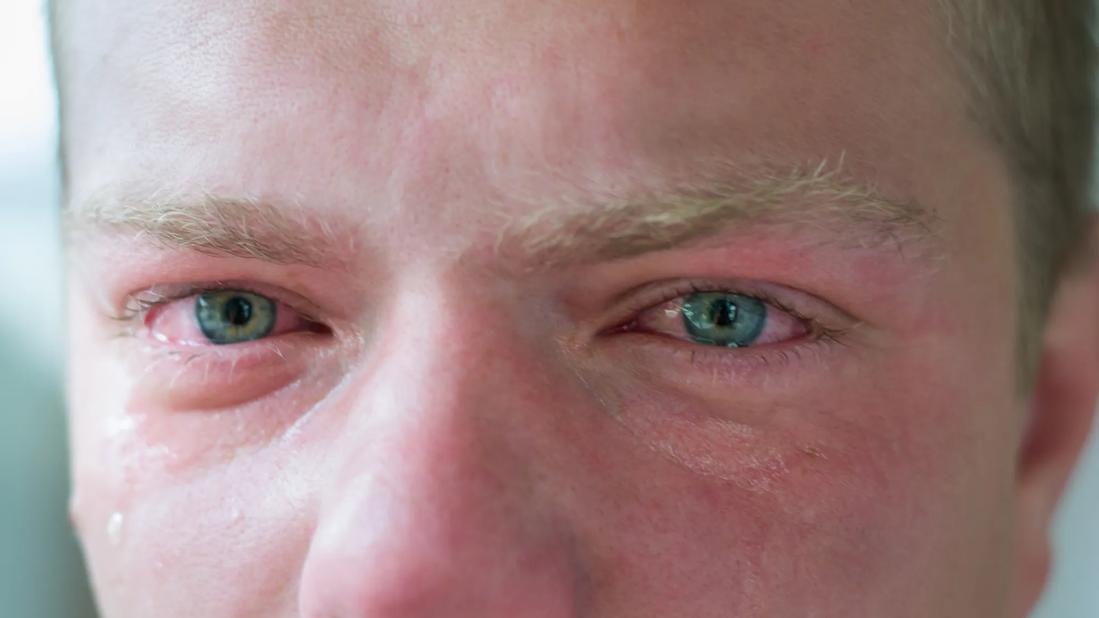Be patient and try at-home remedies like applying a cold compress and elevating your head while sleeping

Image content: This image is available to view online.
View image online (https://assets.clevelandclinic.org/transform/ef6999fd-c0e1-41b9-9a42-7770f3190f41/crying-swollen-red-eyes-979912362)
Person crying, with red, swollen eyes, staring straight at the viewer
Maybe you watched a gut-wrenching movie, you’re upset after a bad breakup or you’re in your feels after seeing your child graduate. Whatever the reason, now, you have swollen eyes from crying.
Advertisement
Cleveland Clinic is a non-profit academic medical center. Advertising on our site helps support our mission. We do not endorse non-Cleveland Clinic products or services. Policy
So, how can you get rid of the puffiness? Family medicine provider Amy Bernstein, DO, shares some easy at-home options that can help.
A good cry can help you deal with your emotions. But as you’re shedding tears, fluid collects under and around your eye. This can lead to swelling and puffiness. Your eyes may also appear red and irritated thanks to the blood vessels in and around your eyes dilating.
Remember, crying is a natural response and it’s OK to express how you feel. And while you may be embarrassed if you have puffy eyes after crying, in most cases, your eyes will depuff in their own time.
“The amount of time can vary from person to person. For example, consider how long you’ve been crying,” says Dr. Bernstein. “For some people, their eyes may become less puffy in just a few minutes. But for others, if they go to sleep after crying, they may wake up the next morning and still have puffy eyes.”
You can reduce the appearance of puffy, swollen eyes from crying with these at-home treatments.
There’s reason applying a cold compress has been a go-to method. A cold compress reduces blood flow, which leads to less inflammation and swelling.
And when it comes to a cold compress, try the following:
Advertisement
“My go-to is a bag of frozen peas because they mold to whatever is underneath them, so you get good coverage with them,” relates Dr. Bernstein. “Apply a cold compress for 10 minutes — and if it starts to become uncomfortable, take it off sooner.”
You can carefully apply pressure to the area with your fingers, says Dr. Bernstein. Start at your nose and work your way outward, massaging along the way.
“Massaging the area may be helpful, but in some cases, touching your delicate skin in the eye area can be irritating and make swelling worse,” she warns.
Face rollers made from jade or rose quartz have become a popular skin care tool. So, if you have one of these lying around the house, it may help reduce inflammation and puffiness.
When using a face roller, make sure you’re rolling out from the center of your face and eyes. And avoid going back and forth with the roller. The key is to roll lightly in one direction.
Similar to the idea of applying a cold compress, you may opt to apply a chilled eye cream or eye serum to the puffy areas around your eye. Many products contain ingredients — like caffeine, vitamin C and hyaluronic acid — designed to help reduce puffiness and brighten the area.
But Dr. Bernstein stresses this isn’t the time to try out a new skin care product.
“The skin around the eye is very thin and very sensitive, so if you’re using a new product, there’s always a chance that your skin could have a reaction,” she notes.
Dr. Bernstein advises caution if you want to apply other solutions, like witch hazel or hemorrhoid cream, as there’s no scientific data that says those things can help with puffy eyes.
“Some people swear by hemorrhoid cream. Some people say it doesn’t work at all,” shares Dr. Bernstein. “It’s certainly something you can try, but there isn’t significant medical data that confirms it will help.”
“Anytime we think about swelling, we think about elevation, as that helps our lymphatic system with drainage,” says Dr. Bernstein. “So, lying down completely flat is never good for swelling.”
Instead, try to stay upright and use extra pillows to prop your head up.
“Sleep is restorative, so you don’t want to interrupt your sleep in the hopes that your eyes will be less puffy when you wake up,” she adds. “Find a sleeping position that works best for you.”
For most people who get puffy eyes after crying, the best remedy is time, says Dr. Bernstein. And at-home treatments may help reduce swelling and irritation.
Advertisement
But if you’re concerned about the puffiness around your eyes, feel any type of eye pain or notice the puffiness doesn’t go away after a few days, Dr. Bernstein says it may be time to see a healthcare provider.
Advertisement

Sign up for our Health Essentials emails for expert guidance on nutrition, fitness, sleep, skin care and more.
Learn more about our editorial process.
Advertisement
Act quickly by locating the object, gently removing the debris and flushing your eye
Pink eye tends to start in one eye before spreading to the other, while allergies usually affect both eyes at the same time
The differences are few, but ophthalmologists can perform eye surgeries and more complex procedures
Keep your eyes clean and avoid using makeup or contacts until you’re fully healed
Early morning red eyes can be a sign of several conditions, like dry eyes, allergies and eye strain
See an eye specialist if your pain isn’t going away and comes with other symptoms
Your eyes could be burning because of allergies, elevated salt levels, dry eyes and more
One is a raised yellow spot on your eye, the other is a fleshy growth
Although it could be used as a moisturizer, this new trend is not recommended
Communicating clear limits helps protect your time, energy and emotional well-being
High cholesterol can be genetic, but testing and treatment can lower your heart disease risk